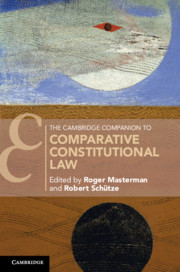Book contents
- Reviews
- The Cambridge Companion to Comparative Constitutional Law
- Cambridge Companions to Law
- The Cambridge Companion toComparative Constitutional Law
- Copyright page
- Contents
- Notes on Contributors
- Acknowledgements
- Table of Cases (Selection)
- Abbreviations
- Introduction
- Part I Theoretical Foundations
- Part II Historical Experiences
- Part III Constitutional Principles
- Part IV State Institutions
- Part V Transnational Constitutionalism
- Index
- References
Part III - Constitutional Principles
Published online by Cambridge University Press: 30 September 2019
- Reviews
- The Cambridge Companion to Comparative Constitutional Law
- Cambridge Companions to Law
- The Cambridge Companion toComparative Constitutional Law
- Copyright page
- Contents
- Notes on Contributors
- Acknowledgements
- Table of Cases (Selection)
- Abbreviations
- Introduction
- Part I Theoretical Foundations
- Part II Historical Experiences
- Part III Constitutional Principles
- Part IV State Institutions
- Part V Transnational Constitutionalism
- Index
- References
- Type
- Chapter
- Information
- The Cambridge Companion to Comparative Constitutional Law , pp. 199 - 332Publisher: Cambridge University PressPrint publication year: 2019



